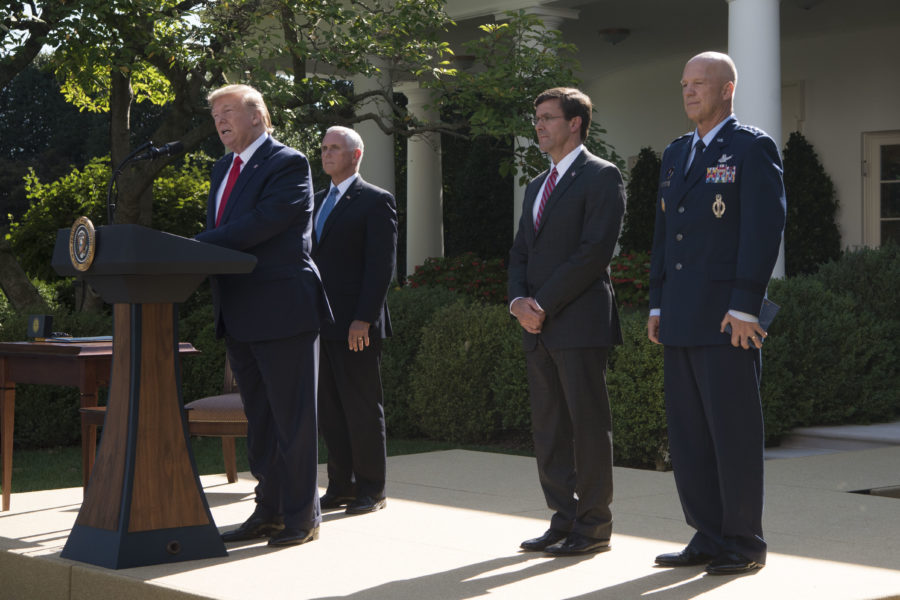The Government Accountability Office expects to report findings in the spring of 2022 in its investigation into the Defense Department’s choice of Alabama as the likely permanent home of U.S. Space Command.
The selection of the Army’s Redstone Arsenal, announced in January 2021, has prompted objections from members of Colorado’s congressional delegation and subsequent investigations by both the GAO and the DOD’s Office of Inspector General. Members of the delegation registered their latest complaint Sept. 30 in the form of a letter to Department of the Air Force Secretary Frank Kendall calling the selection process for the headquarters of DOD’s 11th combatant command a “significant departure” from the norm and alleging, as in past letters, that political angling played a role.
The members of Congress want Kendall to “formally suspend any actions to relocate the USSPACECOM headquarters” until the investigations are complete. The letter is signed by Sen. Michael F. Bennett (D), former Colorado governor Sen. John Hickenlooper (D), and representatives Lauren Boebert (R), Jason Crow (D), Diana DeGette (D), Joe Neguse (D), and Ed Perlmutter (D). Rep. Ken Buck (R) did not sign the letter.
“Congressman Buck has long supported the U.S. Space Command staying in Colorado, having signed multiple letters on the topic in recent years,” spokeswoman Allie Woodward told Air Force Magazine. “Rep. Buck will send his own letter to express his support for keeping it in Colorado, as his priorities remain our country’s military readiness and national security, rather than politics.”
U.S. Space Command’s temporary headquarters is at Peterson Space Force Base in Colorado Springs, Colo., which was home to Air Force Space Command until it inactivated with the creation of the Space Force. The delegation argues that Colorado makes the most sense for the new combatant command, created in parallel with the new military branch, because Colorado is already “the epicenter of operational integration between military and intelligence space assets” and home to numerous military organizations oriented around space. “Additionally, significant evidence exists that the former President’s political considerations influenced the final decision,” according to the letter.
Then-Secretary of Defense Mark Esper assigned the Department of the Air Force the task of evaluating prospective sites in March 2020. He “directed a different approach” from the Department of the Air Force’s usual strategic basing process that also incorporated aspects of the basing process used by Army Futures Command, a Department of the Air Force spokesperson told Air Force Magazine in an email. The department had already announced six locations as finalists but had to start over. The reboot expanded “the number of locations under consideration … by allowing communities to self-nominate,” according to the department spokesperson. The process also provided an opportunity for local communities to pitch incentive packages.
The Department of the Air Force is currently performing an environmental review of Redstone Arsenal’s appropriateness. The review is required before the selection becomes official.
In emailed replies to requests for comment:
A GAO spokesperson said, “GAO’s review of the methodology and scoring of the Department of the Air Force’s decision making process for the location of the permanent headquarters for U.S. Space Command is ongoing. We will be looking into the steps the Air Force took to identify the permanent location and the extent that its process conformed to best practices for analyzing alternatives. We will not have any findings to report until our work is complete. We expect to issue our report in spring 2022.”
A DOD OIG spokesperson said the office had no comment on the delegation’s letter nor the letter’s assertion that the selection process deviated from the norm; and said the office’s work is ongoing: “We do not have a timeline [for completing the investigation].”
A Department of the Air Force spokesperson said, “The Secretary will respond directly to the congressional delegation.”
In addition to alluding to “political considerations,” Colorado’s members of Congress have questioned whether all costs were taken into account in the selection process.
In a December 2020 interview with Central Florida’s Spectrum News, U.S. Rep. Michael Waltz (R-Fla.) took partial credit for upending the original search that had resulted in six finalists being announced in 2019: “Myself, the governor, our senators, [and] a lot of our local officials started asking a lot of tough questions about how this decision was made, what’s the process,” said Waltz, an Army veteran.
In August, former President Donald Trump made headlines by claiming sole credit for the final decision.
